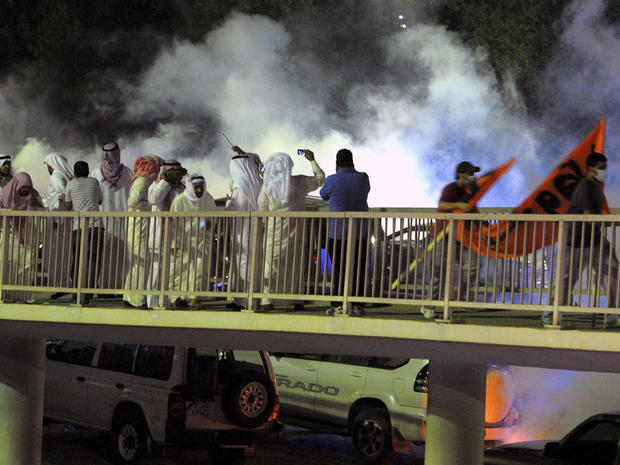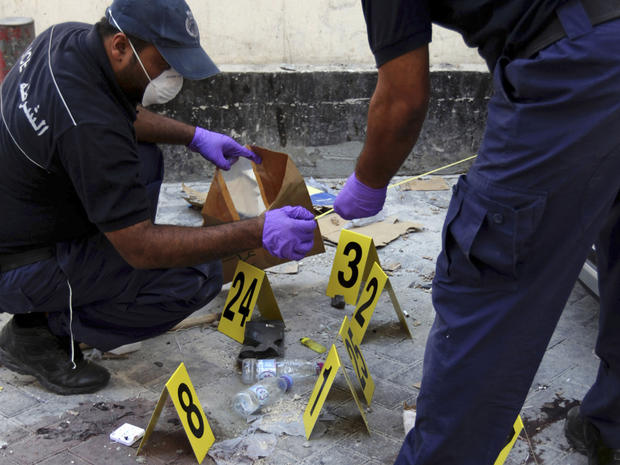Defying rally ban, Kuwaitis are met with tear gas
KUWAIT CITY, Kuwait Riot police blocked off roads and used tear gas, smoke bombs and stun grenades against thousands of demonstrators in Kuwait's capital Sunday.
The protest was against a decree by the Emir that amends the election law.
Kuwait has widened its restrictions on an Islamist-led opposition ahead of a December 1 parliamentary election, including a ban on public gatherings of more than 20 people. Protesters, however, have defied the order despite warnings that a planned anti-government rally Sunday was illegal and would face a stiff backlash from security forces.
Last month authorities arrested opposition figure Musallam al-Barrack for allegedly criticizing the Emir by publicly admonishing him not to lead Kuwait "into the abyss of autocracy."
On Sunday thousands staged a march in a Kuwait City suburb, in defiance of bans against street rallies, as security forces countered with tear gas and stun grenades.
Hundreds of police officers and special forces, manning armored vehicles, deployed at two planned demonstration sites, blocking roads. In an apparent attempt to outwit authorities, protest organizers used Twitter to alert demonstrators to gather Sunday instead in Mishref, about 12 miles south of Kuwait City.
Thousands managed to get through road blocks on the 6th Ring Road Highway, but then organizers called a halt to the protest, Al Jazeera reports.
"After we have expressed our message of rejecting any play in the constitution, we announce the end of the procession," said the organizers on their Twitter account named "The Dignity of a Nation."
There were no immediate reports of injuries. The Information Ministry told Reuters that 28 people were arrested Sunday, adding that demonstrations were allowed with the proper permit.
Security forces have used tear gas to break up two earlier protests by tens of thousands of demonstrators in the past two weeks, in which more than 130 protesters and 16 policemen were injured.
Across the region, bloggers and social media activists also are facing increasing pressures for violating laws against direct criticism of the sheiks and monarchs that control the Gulf. Last week, a Bahraini man was sentenced to six months in prison after being charged with insulting the king.
"The Gulf is a delicate dance for the West," said Ali al-Ahmed, director of the Washington-based Institute of Gulf Affairs. "The Gulf leaders know they are insulated. There could be rising complaints from Washington or London about various hardline measures, but no one realistically thinks the West will do anything more than complain."
On Wednesday, foreign ministers from the Gulf Cooperation Council plan to meet in Bahrain to discuss regional issues, including the growing clashes in Kuwait and tensions in Bahrain, where more than 55 people have been killed in violent unrest since February 2011. That island nation's majority Shiites are pressing for a greater political voice in the Sunni-ruled government.
Shiites make up about 70 percent of Bahrain's 525,000 citizens. They claim they face systematic discrimination, such as being blocked from top political and security posts.
Bahrain recently banned all protest gatherings in attempts to quell the deepening unrest in the strategic kingdom, which is home the U.S. Navy's 5th Fleet. But clashes have not eased; crowds pelted three police stations with firebombs early Sunday, and on Monday a series of apparently coordinated bomb blasts in Bahrain's capital Manama killed two people, authorities said.
Authorities in Bahrain have increasingly blamed Shiite power Iran or its proxies for encouraging the protests. No clear evidence has emerged to back up the claims, and Iran denies any direct role.
Bahraini officials have suggested there could be crackdowns against Shiite religious leaders, which could sharply intensify the clashes. Government spokeswoman Sameera Rajab blamed the attacks on statements by some Shiite "religious figures who haven't ceased inciting violence against civilians and police."
The nation's Western allies have urged renewed efforts at dialogue to ease the crisis, but opposition groups insist that talks cannot move forward unless the monarchy is willing to make greater concessions to loosen its hold on the country's affairs. Bahrain's leaders have so far made reforms that include transferring more oversight powers to the elected parliament.
Last week, the U.S. State Department issued unusually harsh criticism against its ally Bahrain after a decision to outlaw public demonstrations. Previously, officials in Bahrain had permitted some protest marches, but most clashes have occurred outside the authorized rallies.
"The decision to curb these rights is contrary to Bahrain's professed commitment to reform and will not help advance national reconciliation nor build trust among all parties," said State Department spokesman Mark Toner.
Saudi Arabia said last month it was "insulted" by a British parliament inquiry into possible Saudi human rights violations and its military assistance to Bahrain's embattled monarchy. Saudi forces also have waged an ongoing battle against groups from the kingdom's Shiite majority that claim they face systematic discrimination.
Meanwhile, the the United Arab Emirates has angrily challenged a European Parliament resolution last week that denounced "assaults, repression and intimidation" against rights activists and suspected members of an Islamist group that officials consider a threat to the state. More than 60 people have been detained in the past year in one of the quietest ongoing crackdowns of the Arab Spring, rights groups say.
In the UAE, the main target is an Islamist group, al-Islah, which authorities worry could try to undermine the control of the ruling clans in Dubai, Abu Dhabi and other emirates. Al-Islah says it only seeks a wider public voice in the country's affairs - but even that is considered dangerous territory in a nation that allows no political parties and swiftly stamps out any signs of public protests.
Dubai's police chief, Lt. Gen. Dahi Khalfan Tamim, warned in September of an "international plot" to overthrow the governments of Gulf Arab countries by Islamist factions inspired by the rise to power of the Muslim Brotherhood in Egypt.
"The Muslim Brotherhood does not believe in the nation state," said the UAE's foreign minister, Sheik Abdullah bin Zayed Al Nahyan, last month. "It does not believe in the sovereignty of the state."
Curiously, the claim came just weeks after the UAE's president, Sheik Khalifa bin Zayed Al Nahyan, offered an invitation to Egyptian President, Mohammed Morsi to visit Abu Dhabi.

